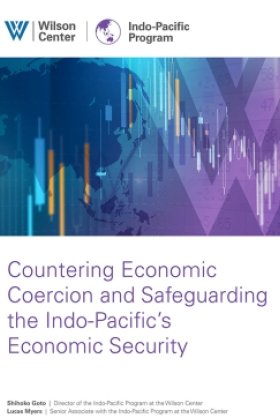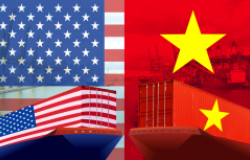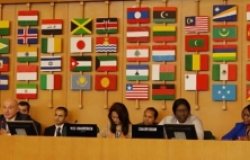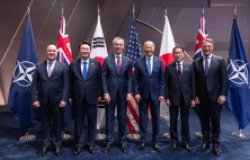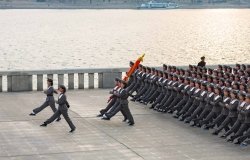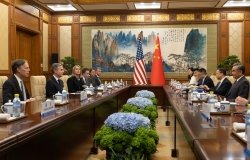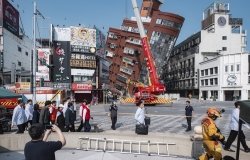Development of the Chinese Military: Implications for the United States and Asia
Bernard Cole, National Defense University; Lonnie Henley, Centra Technologies; Jing Huang, senior fellow, The Brookings Institution; Susan Puska, Department of State; Philip Saunders, National Defense University; Andrew Scobell, U.S. Army War College; Michael Swaine, Carnegie Endowment for International Peace; David Shambaugh, George Washington University(Co-hosted with Library of Congress and National Defense University) This event will be webcast.
Overview
To watch the webcast, follow the links in the "See Also" box to the right of this screen.
Recent developments in Chinese military affairs will directly affect the formulation of U.S. defense and foreign policy, as well as the strategies of U.S. friends and allies in Asia. To examine China's military development and its implications for the United States and Asia, eight distinguished experts spoke at a January 13 seminar co-hosted by the Woodrow Wilson Center's Asia Program, National Defense University's Center for the Study of Chinese Military Affairs, and the Library of Congress's Science & Technology Division. Over two hundred people attended the seminar, demonstrating the great appeal of such a topic to the Washington community.
Huang observed a rise of military professionalism in China since 1980. The formal transfer of military power from former leader Jiang Zemin to Party General Secretary Hu Jintao during 2004 suggested that the principle of "the Party commands the gun" has been institutionalized—the Party leader's formal post is more important than his personal prestige. However, political loyalty still overshadows military performance, and many low ranking officers misperceive the U.S. army as a straw man—following the Party's tune.
Scobell echoed Huang that military professionalism has not "de-politicized" the Chinese army. The military has strong ties not only with the Party, but also with the state and society. In analyzing Party-state-military connections in China, Scobell noted that Beijing condemned "military nationalization" as a bad idea; and that the army not only supported Jiang's reelection as chairman of the Party Central Military Commission in 2002, but also took a hawkish position toward Taiwan.
Henley highlighted a low level of education and the lack of combat experience among the officer corps of the People's Liberation Army (PLA). Since the end of the civil war in 1949, the PLA has actively engaged only in the 1950-53 Korean War and, far less extensively, the 1979 Sino-Vietnamese military conflict. Henley observed that as a new generation of military officers grows up, the PLA is moving away from its old doctrine of "human wave tactics" and is now more likely to follow U.S. war doctrines and operational concepts. Still, it will take at least 10 years for the PLA to significantly improve its combat competency.
Swaine noted that the Chinese military has adopted a combined continental/maritime strategy. This new orientation requires more mobile and sophisticated "active peripheral defense" capabilities for both inland and coastal areas. As Chinese military advantages vis-à-vis Taiwan continue to increase over time, Taiwan cannot defend itself unaided by the United States. However, Taiwan ought to resist an initial PRC attack until the United States can deploy forces in that region.
Saunders argued that the Chinese deterrent is vulnerable. Its credibility, if any, rests on the adversary's uncertainty about numbers and precise locations of China's nuclear missiles, bombers, and strategic warheads. However, China is likely to build a credible nuclear deterrent by 2010-2015 with different types of advanced intercontinental ballistic missiles (ICBMs). The ultimate size of the Chinese nuclear arsenal will hinge on U.S.-China political relations, and the effectiveness of U.S. missile defenses.
Cole argued that Beijing's priorities in ensuring the availability of foreign-controlled energy resources have important national security implications. As the second largest energy-consuming country in the world after the United States, China relies on its navy to protect sea lines for energy transportation. Beijing's aggressive maritime strategy may create new political tensions in the Taiwan Strait and the South China Sea, Cole warned.
Puska pointed out that Beijing sees U.S. military actions in Iraq and Afghanistan not only as a war on terrorism, but also as a strategy of soft-containment against China. Beijing feels that terrorism does threaten China's national interest. However, it prefers maintaining good relations with Middle East countries and letting the United States be entangled in difficulties in reestablishing a new political order in Middle East.
Shambaugh offered a commentary on the progress and weakness in the field of Chinese military studies at the end of the seminar. According to him, studies on Chinese military have produced more than a dozen books with rich empirical data in recent years. However, PLA studies usually involve experts in war colleges or think tanks with military connections only, with insufficient theoretic frameworks and comparative perspectives. Shambaugh concluded that PLA studies in the future should involve more experts from the civilian academic circle. China's rise and military development, plus the acute interest in this topic as this seminar has demonstrated, apparently justify such a prescription.
Hosted By

Indo-Pacific Program
The Indo-Pacific Program promotes policy debate and intellectual discussions on US interests in the Asia-Pacific as well as political, economic, security, and social issues relating to the world’s most populous and economically dynamic region. Read more
Thank you for your interest in this event. Please send any feedback or questions to our Events staff.
